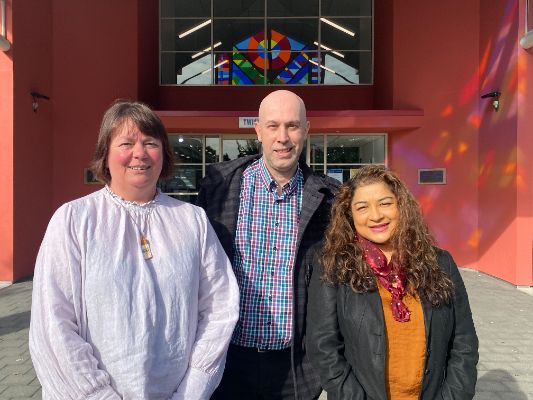EIT Promotes Three Recognised Researchers To Associate Professor Position
Three locally and internationally recognised EIT researchers and academics have been promoted to Associate Professor in recognition of the work they have done.
The three staff members are Dr Emily Nelson, who was Principal Academic Staff Member (PASM) in EIT’s School of Education & Social Sciences as well as Programme Coordinator of the Bachelor of Teaching (Primary) programme; Dr Emre Erturk, who was Principal Academic Staff Member (PASM) in EIT’s School of Computing; and Dr Anita Jagroop-Dearing, Postgraduate Programme Coordinator in Health Science, who was a Senior Academic Staff Member (SASM) in EIT’s School of Health and Sport Science.

EIT Chief Executive Chris Collins says the three staff members are good examples of the depth of research talent and academic leadership that EIT has.
“All three are research leaders in their fields and have brought much recognition for EIT’s research capabilities. Congratulations to Emily, Anita and Emre on this achievement.”
“With talent like this in our Professoriate, EIT will enter into Te Pūkenga in good health on the research front.”
EIT Executive Dean Professor Nat Waran, who oversees research at EIT, says the promotions are well deserved.
“We are proud of our community centred, globally relevant research at EIT. Our three new Associate Professors are accomplished research leaders, and their promotion is recognition of the outstanding contribution they have made within their discipline areas .They are very welcome new members of the EIT Professoriate.”
Dr Nelson says she is excited to join the professoriate and feels fortunate because the application process has been rigorous and validated by existing members of the national and international professoriate.
“It has been a seven year project since gaining my PhD. As with many things of this nature, you have to demonstrate you are working at this level to be recognised at this level and along the way this has really pushed my growth, to contribute in ways that stretch me, that support others and that progress agendas beyond my individual research. It has required becoming more strategic, connected and collaborative.”
“I really want to focus my research agenda, to take stock of what is important to me and to channel my contribution to the professoriate into initiatives and research projects that promote student voice within curriculum and policy design both in the primary education sphere and in initial teacher education nationally and internationally.”
She says she also wants to continue to support the strategic development of research at EIT, and the ongoing development of researcher capability.
Dr Jagroop-Dearing says she did not achieve this promotion on her own and she needed to acknowledge her family, colleagues and mentors along the way who supported and believed in her. I hope I can make them proud and be worthy of this title.”
“This has been a long journey, of several years in the making, so not surprisingly I feel relieved. But I am also excited, honoured and humbled to be recognised as an academic who has made an outstanding contribution in my field of health research and scholarship.
“As an Associate Professor I look forward to strengthening and supporting community and Māori health research and capability across the institution. I also think this status would allow me to better facilitate the connections of other health researchers, regional and in New Zealand.”
Dr Jagroop-Dearing says that in regard to her own research she hopes this title will give her a higher platform from where she can continue to represent EIT nationally and internationally and attract more collaborative projects and funding.
Dr Erturk says he is very happy with the promotion.
“I see the Associate Professor role as one of the many growth opportunities EIT provides to its staff. It represents a culmination both for me and my department. Often, it is not enough to be operating at a high level without the official title – as the impact and uptake of our research outputs and projects is also influenced by one’s title.”
“This is especially important as EIT researchers are often competing and collaborating with their counterparts across institutes and universities in New Zealand and around the world. For my research journey, it relieves me from focusing on promotion, and allows me to be more selective about the research activities I would participate in.”
Dr Erturk says he is hoping to increase the quality of his research and look into some novel initiatives in the future.


 Hospice NZ: Sustainable Funding For Hospices
Hospice NZ: Sustainable Funding For Hospices David Hill - LDR: Surge In Young Parents’ College Enrolments
David Hill - LDR: Surge In Young Parents’ College Enrolments NZEI Te Riu Roa: School Lunches - Give Schools Option To Use In-School And Community Providers Immediately, Union Says
NZEI Te Riu Roa: School Lunches - Give Schools Option To Use In-School And Community Providers Immediately, Union Says University of Auckland: Billion-dollar Business Lessons From Kiwi Entrepreneur
University of Auckland: Billion-dollar Business Lessons From Kiwi Entrepreneur NZ Veterinary Association: NZVA Celebrates Welcome Additional Support From Veterinary Nurses
NZ Veterinary Association: NZVA Celebrates Welcome Additional Support From Veterinary Nurses Michael King Writers Centre: New Zealand’s National Writer-Residency Organisation Announces Its 2025 International Residency With Australia
Michael King Writers Centre: New Zealand’s National Writer-Residency Organisation Announces Its 2025 International Residency With Australia